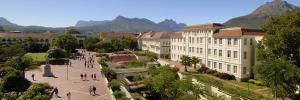
SU committed to fighting the effects of global warming
Stellenbosch University (SU) is committed to fighting the effects of global warming and providing new alternatives to support essential changes and transitions to more sustainable societies. Read the below statement by the Rectorate of Stellenbosch University, outlining this commitment:
- Climate change is no longer a far-off problem, it is happening right here and right now.
- There is general consensus among the world's scientific community that climate warming trends are the result of human activities.
- As a major contributor to the emission of greenhouse gasses on the African continent, South Africa can't sit back and wash its hands of this mounting humanitarian and environmental crisis.
- Moreover, there is global agreement that swift action is needed to turn the tide on global warming.
It is with these acute realisations that the Rectorate of Stellenbosch University is serious in taking up the challenge of fighting the effects of global warming and we wholeheartedly endorse your sentiments of “action now, to build back and restore our planet for the future".
Stellenbosch University has the capacity to contribute significantly to research and in providing solutions to fight the effects of climate change.
Therefore, the establishment of our School for Climate Studies last year, presents a major step forward in researching sustainable solutions in curbing the ever-growing threat of planet-warming with all its disastrous effects.
It is not only the first school of its kind on the continent, but we are tackling this challenge in partnership with leading international organisations. Among them counts the Global Alliance of Universities on Climate, which include the universities of Oxford and Cambridge; Massachusetts Institute of Technology; the University of California, Berkeley; Tsinghua University in China and many other leading universities across the world.
It is a harsh reality that current processes that support economic development are significantly altering the climate, the oceans and land surfaces. Countries have the task of balancing the acceleration of economic growth with the sustainable use of environmental resources. What has thus become imperative, is partnerships on a global scale to rethink prosperity, development and growth in the context of the green economy. These are some of the profound challenges that the School for Climate Studies will address via its multi-disciplinary approach.
Furthermore, the School provides a nexus for our university to further embed sustainability in all its forms and nuances across our core functions of learning and teaching, research and impact on the communities that we serve.
From an operational perspective, Stellenbosch University has over the last few years taken significant steps to transform our institution to a carbon neutral university.
Systemic sustainability is one of the critical attributes of the University's Vision 2040 and Strategic Framework 2019–2024. This includes the long-term cost-effective provision of sustainable energy. The aim is to reduce the University's carbon emissions to net zero by 2030 by replacing our current fossil fuel-based energy with clean, renewable energy, including solar power.
The new rooftop photovoltaic installation at the Neelsie Student Centre is set to make a considerable contribution in this regard. The installation was completed in January 2021. The system will substantially cut the institution's carbon footprint by 6 000 tons of carbon over the next 20 years.
Current interventions towards a sustainable energy future implemented by our university include:
- the installation of smart meters across campus that transmit live data on electricity consumption every five minutes;
- the installation of a smart medium-voltage micro grid to allow for large photovoltaic installations on the edge of campus;
- a consolidated heating, ventilation and air-conditioning precinct plant;
- a new building management system to optimise consumption and reduce SU's carbon footprint;
- the replacement of dated lighting with energy-efficient LEDs; and
- smart electrical upgrades.
For the immediate future, the University's Environmental Sustainability Plan will be our guide in making our campuses even more environmentally and ecologically sustainable. Ultimately, more resilient, greener campuses will mean lower emissions and a smaller carbon footprint.
So, in conclusion: with these few words, we trust that you have gained a sense of the seriousness and commitment of our university to provide new alternatives to support essential changes and transitions to more sustainable societies. View us as knowledge partners and builders of the green future that we all so desperately seek for our planet.
